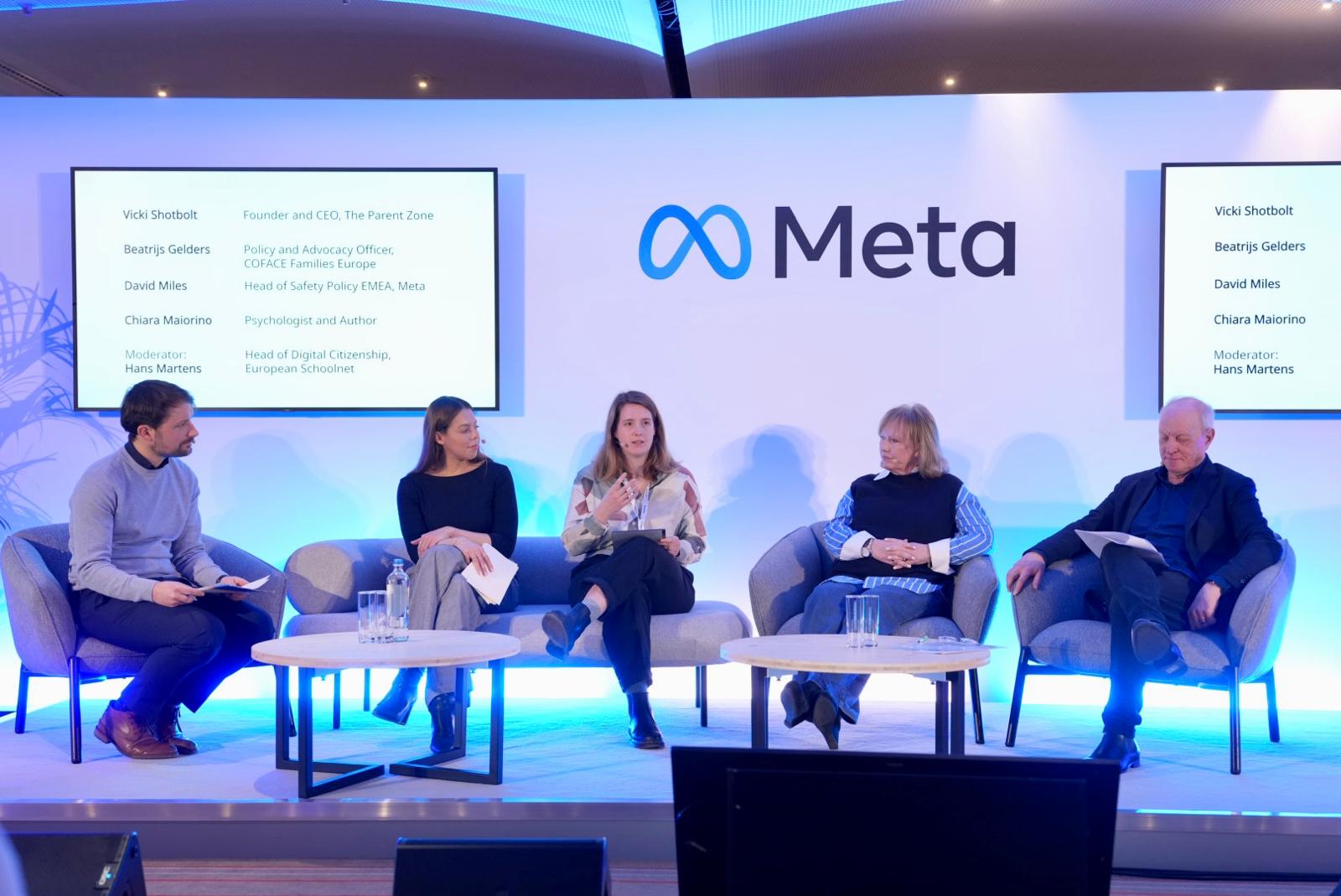In this event opened by European Parliament President, Roberta Metsola, COFACE Families Europe brought the perspective of families to the discussion, namely in a panel on Working together to Support the Well-being of Teens Online alongside the following speakers:
– Vicki Shotbolt, Founder and CEO of The Parent Zone
– Beatrijs Gelders, Policy and Advocacy Officer, COFACE Families Europe
– David Miles, Head of Safety Policy EMEA, Meta
– Chiara Maiorino, Psychologist, young creator and member of Our Feed, Our Future Network
Moderator: Hans Martens, Head of Digital Citizenship at European Schoolnet
Key messages included:
- Well-being online for young people today means creating an online environment which is inclusive and accessible for all, where human rights and more specifically children’s rights are respected, and where users can decide how and for how long they interact with digital services and products.
- The will from social media companies to improve child safety on their platforms is welcomed. The teen accounts from Meta, for example, with default privacy settings are a step in the right direction of offering age-appropriate experiences to users. However, it is not only about having age assurance and parental control tools in place. It is also about effective content moderation (e.g. removing illegal content, including child sexual abuse material (CSAM) or content that promotes suicide or self-harm), dealing with addictive design (eg autoplay of videos), being transparent about recommendation systems and algorithms, having better reporting tools.
- Digital platforms are geared towards profit making and keeping people online as long as possible rather than geared to enhance human rights. This needs to change. Big tech companies should invest their knowledge and money in making sure that their services and products are safe and transparent for users. Furthermore, it’s important that tech companies are transparent and share how well the measures and tools they implement are working.
- COFACE member organisations are playing their part, creating spaces of learning for families, running information campaigns, create resources and more. Such as the campaign of UNAF Spain on sexism in video games or the French resource of UNAF “Mon enfant et les écrans (my children and screens), a website which offers clear and practical information which is regularly updated. See more our 2024 COFACE policy brief.
- Age assurance can play a role in keeping young people safe, but then we also need to make sure that there are age-appropriate experiences in place and that the services are designed in a safe, secure and privacy-preserving way. We need a comprehensive set of solutions and measures to enhance children’s rights online. It is not only about the right to protection, but also the right to an opinion, right to information, right to privacy.
- Communicate with your children and let them be involved in co-creating the rules together (according to age and maturity of the child). There is not one right way of doing this. Families are diverse and can have varying ways of dealing with this. Clear rules can be set before starting a new device, no phone at certain moments can be part of the family routine, taking away the device at certain moments.
- Parental control tools may exist in some cases, the take-up is not always possible due to lack of time or knowledge. For some parents/caregivers this could support them, however this will not be the case for everyone. The burden should not be fully on parents and caregivers. First of all, parents do not always have the necessary digital skills in place to navigate different parental control tools connected to different apps. Secondly, they do not always have the time to be up to date with everything their children are doing online. Families are diverse, no family is the same, some families face discriminations and live in vulnerable situations, parents and caregivers have other things to deal with first (work, food, school, admin, health – related) before being involved in the online environment of their children. Thirdly, some parents do not always make the right choices for their children, might even be abusive, and some children might not have parents or caregivers by their side.
- With reactive policies such as social media bans being proposed in different countries, it’s even more important to listen to what young people themselves have to say about this and to ensure a safe digital environment. In addition, the voice of all young people should be heard, and especially those in more vulnerable situations or more discriminated situations, such as LGBTQ+ youth, young people with disabilities and migrant youth.
See further information here.





